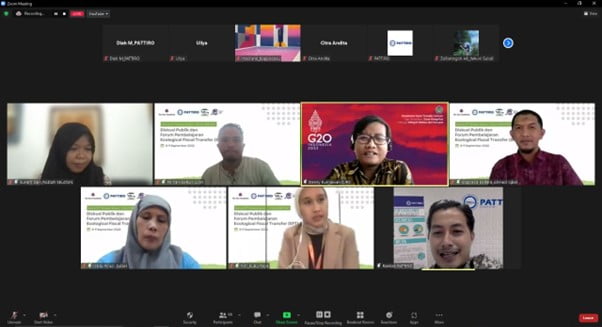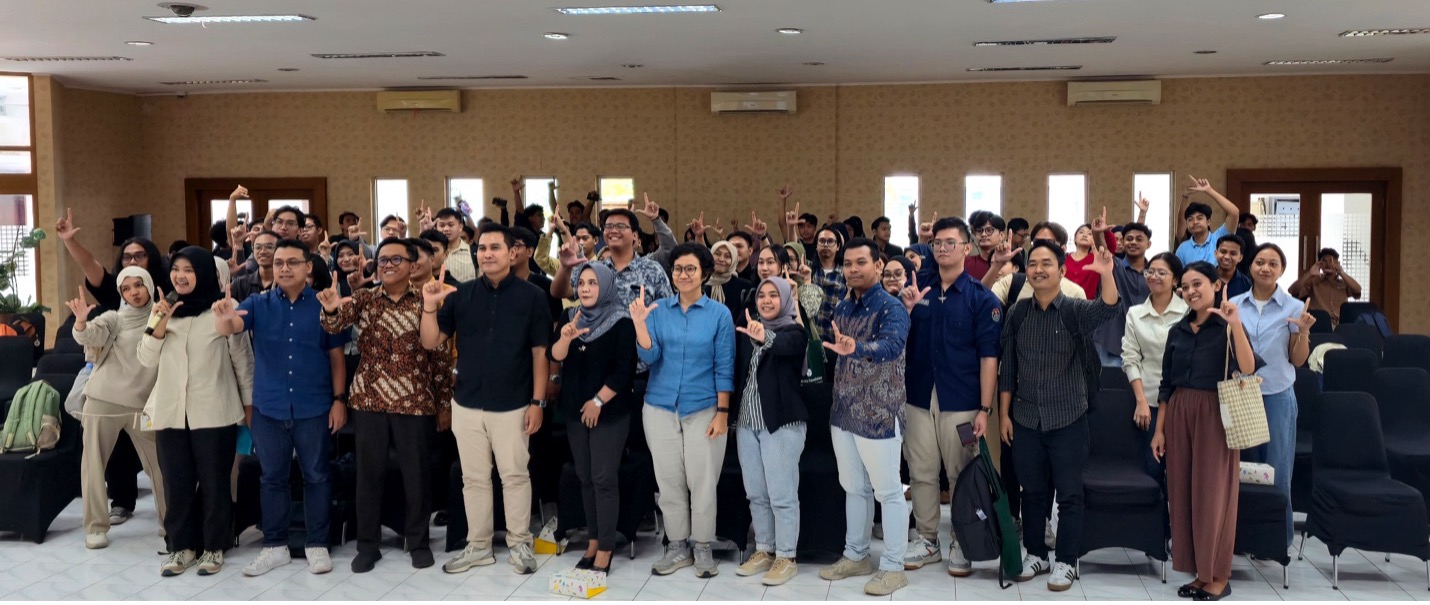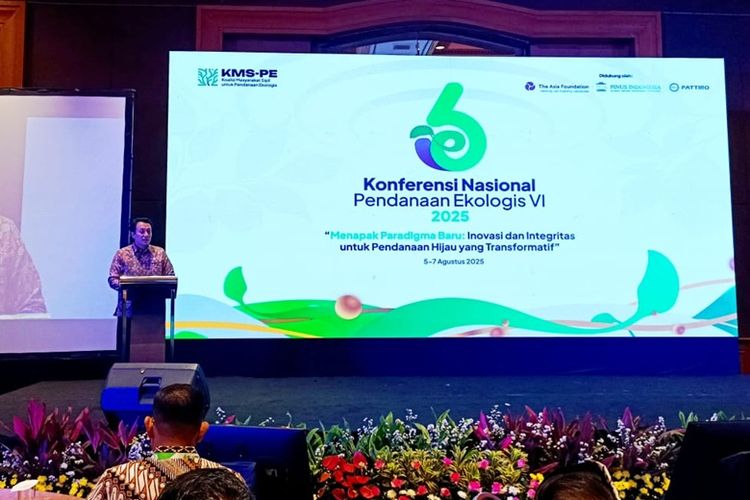
The low carbon development agenda is a strategic agenda that is being touted by the government in order to pursue the target of reducing Green House Gas (GHG) emissions, which is 29% unconditional (with their own efforts) and 41% with international support in 2030. In order to realize this target, PATTIRO with the Civil Society Coalition for Environmental Protection Funding supported by The Asia Foundation since 2018 have initiated the idea of implementing an ecological fiscal transfer (EFT) policy.
In order to disseminate EFT policy ideas and best practices in implementing EFT in the regions, as well as build government commitment, both at the regional and central levels in developing the TAPE, TAKE and ALAKE schemes, PATTIRO is supported by The Asia Foundation to hold a Public Discussion and Online Learning Forum on “Incentives Ecology-Based Fiscal for Realizing Low Carbon Development in Indonesia”, Thursday, 8 September 2022 and Friday, 9 September 2022. This online activity presented speakers from the Government, both Regional and Central Governments, academics, and civil society groups.
Program Officer of The Asia Foundation, Ridwan, in his remarks stressed that on a national scale, the application of EFT is encouraged as a policy to contribute to the Low Carbon Development agenda to reduce GHG emissions, especially in the forestry sector. So far, 18 local governments consisting of two provinces and 16 districts/cities have adopted the EFT idea in the form of Ecology-based Provincial Budget Transfers (TAPE), Ecology-based District Budget Transfers (TAKE), and Ecology-based Village Budget Allocations (ALAKE).
Meanwhile, the PATTIRO Management Board, Fitria Muslih, conveyed that the discussion initiated by a civil society group became a regional initiative to realize good environmental management in the region. Thus, this initiative needs to be replicated through policies and institutions. “Hopefully, through this discussion the EFT idea can be replicated in other regions or provinces,” said Fitria.
In his presentation, an academic from the Faculty of Forestry, Hasanuddin University, Syamsu Rijal, said that the EFT scheme is an innovation that hopes to improve the performance of environmental management in the regions to make it better. The TAPE initiative in South Sulawesi was initiated using a special financial assistance scheme from the province to the districts/cities. TAPE indicators for the assessment of the proposed financial assistance include reducing GHG emissions, changes in vegetation cover, sustainable agriculture, and new renewable energy and energy conservation.
The funding scheme with EFT basically does not add to the burden on the Regional Revenue and Expenditure Budget (APBD). This scheme is a reformulation of the mechanism for allocating a higher government budget to a lower government by including indicators of environmental protection and forestry in its budget allocation. Researcher from the National Research and Innovation Agency (BRIN), Fitri Nurfatriani, also added that the governance of TAPE/TAKE implementation provides incentives to relevant regional governments depending on their performance and commitment to environmental issues.
The secretary of Bappelitbangda South Sulawesi, Junaedi, in his presentation stated that the instrument of ecological-based budget transfers is very useful for improving the performance of local governments in protecting the environment. The TAPE incentive is a form of reward for the South Sulawesi Provincial Government in carrying out its commitment to low carbon development as a follow-up to the memorandum of understanding (MoU) between the Governor of South Sulawesi and the Ministry of National Development Planning/Bappenas in supporting low carbon development. “Hopefully, the TAPE scheme that is being initiated can help achieve targets and indicators related to the environment set out in the Regional Medium-Term Development Plan (RPJMD),” said Junaedi.
This was also emphasized by the Coordinator of Low Carbon Development of the Ministry of National Development Planning/Bappenas, Irfan Yananto. In his presentation, he mentioned that the criteria proposed for the development of TAPE in South Sulawesi Province were in line with the low carbon development agenda being pushed by the central government. Irfan also confirmed that the TAPE scheme can help achieve targets and indicators related to the environment that have been set in the Regional Low Carbon Development Plan (RPRKD) and South Sulawesi’s RPJMD.
In practice, the application of the EFT scheme in general in the regions has an impact on the regions concerned, especially in ecology-based development. Head of the North Kalimantan Research and Development Agency’s Natural Resources Development Sub-Division, Ahmad Iqbal, said that the distribution of the TAPE budget to districts/cities in 2020-2022 has triggered the strengthening of the regional agenda and the development of innovation in the environmental sector in North Kalimantan. “It can be said that all districts/cities in North Kalimantan use the budget to improve their ecological performance,” said Iqbal.
Apart from providing positive opportunities, the implementation of the EFT scheme faces challenges in its implementation in several regions. In general, there is a need for further outreach regarding the emphasis on the allocation and use of TAPE and TAKE budgets. Head of the GeRAK Aceh Public Policy and Budget Division, Fernan, said that at first there was an assumption that the EFT policy initiative would undermine the Regional Revenue and Expenditure Budget (APBD) funding. Meanwhile in Maros, South Sulawesi, there are still village heads who are resistant to the Village Fund Allocation (ADD) formulation in the EFT scheme. “Villages that used to receive the budget will not necessarily receive it again because previously the budget was divided equally, but now it has to go through an assessment process,” said Ismawati from PINUS South Sulawesi.
Chairperson of the DPMD Village Finance and Asset Development Division, Kubu Raya Regency, Rini Kurnia Solihat, also said that in Kubu Raya Regency, the TAKE allocation was used to finance the operational implementation of the village administration, not for activities related to strengthening the ecology.
In addition, the Government through Bappenas has a forum that accommodates low-carbon and climate-resilient development plans that have been made by a region called Aksara. Aksara aims to provide data, collect data, and support the credibility and transparency of low-carbon and climate-resilient development efforts. The data contained in TAPE can be used as material for filling in the script.




